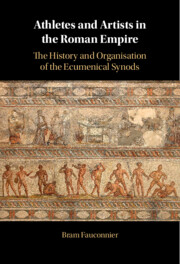Book contents
- Athletes and Artists in the Roman Empire
- Athletes and Artists in the Roman Empire
- Copyright page
- Dedication
- Contents
- Figures
- Maps
- Acknowledgements
- Note on Abbreviations
- Introduction
- Part I History
- Chapter 1 Hellenistic Artists’ Associations
- Chapter 2 The Emergence of the Ecumenical Synods of Competitors
- Chapter 3 The Development of the Ecumenical Synods in the First Century ad
- Chapter 4 All Roads Lead to Rome
- Chapter 5 On Tour through the Festival World
- Chapter 6 The Decline of the Ecumenical Synods
- Part II Organisation
- Book part
- References
- Index Locorum
- Subject Index
Chapter 2 - The Emergence of the Ecumenical Synods of Competitors
from Part I - History
Published online by Cambridge University Press: 02 February 2023
- Athletes and Artists in the Roman Empire
- Athletes and Artists in the Roman Empire
- Copyright page
- Dedication
- Contents
- Figures
- Maps
- Acknowledgements
- Note on Abbreviations
- Introduction
- Part I History
- Chapter 1 Hellenistic Artists’ Associations
- Chapter 2 The Emergence of the Ecumenical Synods of Competitors
- Chapter 3 The Development of the Ecumenical Synods in the First Century ad
- Chapter 4 All Roads Lead to Rome
- Chapter 5 On Tour through the Festival World
- Chapter 6 The Decline of the Ecumenical Synods
- Part II Organisation
- Book part
- References
- Index Locorum
- Subject Index
Summary
This chapter bridges the gap between the disappearance of the Hellenistic artists’ associations in the first century bc and the emergence of the ecumenical synods at the end of that century. It begins with a discussion of the first attestations of the ecumenical synods. The ecumenical athletes’ association is first attested in a letter by Mark Antony from the 40s or 30s bc. The first clear evidence of the ecumenical synod of artists dates only from the reign of Claudius (AD 41-54), but there are indications that the artists were already banding together on a transregional scale in the 30s bc. Next, this chapter seeks to explain the emergence of the synods by looking at the broader context of Mediterranean integration. It argues that the synods’ emergence was connected to the development of an 'international' festival network, which was in turn made possible by the Roman unification of the Mediterranean. Moreover, it appears that the Roman takeover in the east created the right conditions for the establishment of associations that transcended the polis framework. Especially the province of Asia seems to have provided fertile soil for experimenting with new organisational forms.
Keywords
- Type
- Chapter
- Information
- Athletes and Artists in the Roman EmpireThe History and Organisation of the Ecumenical Synods, pp. 34 - 70Publisher: Cambridge University PressPrint publication year: 2023

